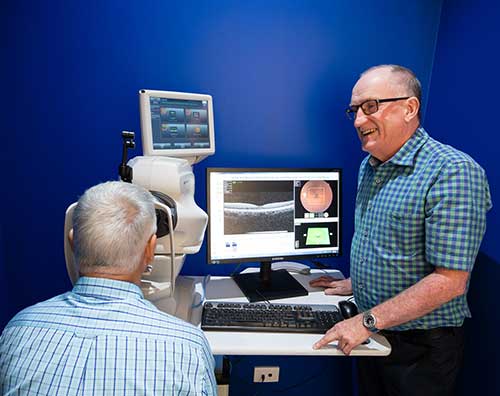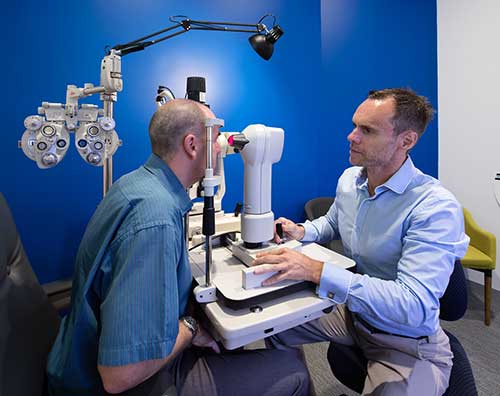
Our role as Optometrists is not only to check for spectacle needs but, during our comprehensive examination, we will also check for signs of eye disease. Quite often we will also use drops to dilate your pupils to help us fully examine the back of your eyes.
We are always at the forefront of new technologies – be it with frames and sunglasses or with thinner, lighter spectacle lenses. Most importantly we are always at the forefront of new technology regarding Diagnostic equipment - our OCT allows for earlier detection, and therefore intervention, of conditions like Glaucoma, Macular Degeneration and Diabetes. Photographing and scanning the retina and optic nerves is now regarded at the gold standard for Optometric care.
Remember always to bring your sunglasses with you for your examination. We will endeavour to answer all your questions regarding the condition of YOUR eyes and in the situation where we need a "specialist" opinion we will organise this for you by referring you to an Ophthalmologist.

We recommend you have your eyes checked every two years and we would suggest even more regularly if you have family histories of glaucoma, diabetes, macular degeneration or any other eye or health problem that could affect your vision.
Our Commitment to you is to provide the highest possible level of eye care and to look after your vision needs on a one to one basis at all times. We do not believe in "supermarket" eye care and to this we promise you will always see the Optometrist of your choice.
Lewis and McConnell Optometrist is owned and run by the Optometrists involved in your care and they are proud of their professional approach and reputation.
Lewis and McConnell Optometrist is FAMILY owned and run by the Optometrists involved in your care and they are proud of their professional approach and reputation.

Myopia is the technical name for short sight. An eye is called short sighted (or myopic) because light coming from a distant source such as the TV is focused "short" of the Retina at the back of the eye.
Hyperopia is the technical name for long sight and is the opposite to myopia as the image from a distant source is focused behind the retina. Young eyes have a false advantage if they are hyperopic as their natural lens can bring the focus closer to the retina by "accommodating" (increased focus power). As we get older we lose this automatic ability and we become Presbyopic.
Presbyopia is the technical name for this inability to focus up close and generally occurs in our mid forties - another very noticeable sign that we are getting older. Many people blame the use of specs for this need for stronger lenses but it is really only because our natural lens has gradually lost its flexibility (starting from when we are quite young) and we need to gradually supplement this loss of focusing power with an artificial spectacle lens. This need for stronger lenses does slow down in our early 50's.
Glaucoma is a disease of the Optic Nerve that generally has no symptoms and if left undiagnosed and untreated will lead to blindness. Glaucoma is detected by a series of routine tests which include measuring the pressure within each eyeball with a simple test, examination of the optic nerve and a discussion with our patient about family history and general health issues.
If any of these findings are uncertain we may wish to perform a computerised visual field analysis which checks for changes in peripheral vision. These changes can be subtle in early glaucoma which is a good reason for every body (particularly those over the magical age of 40) to have their vision and eye health checked regularly.